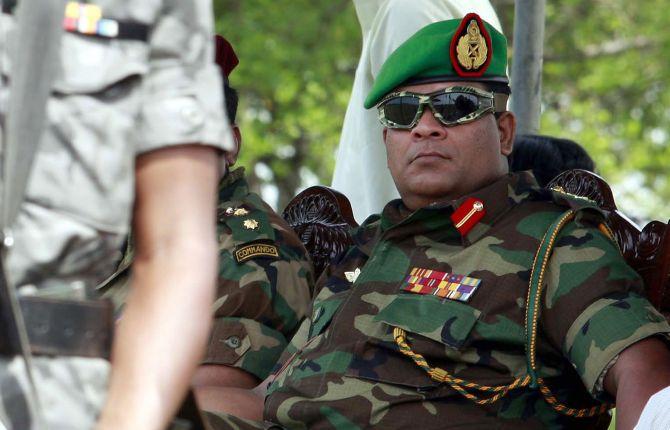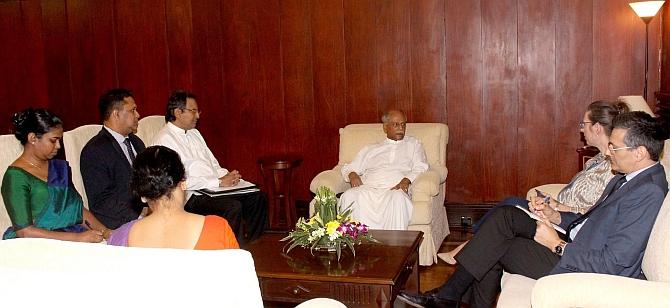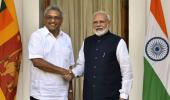'Clearly, Washington has all but given up hope following US Acting Assistant Secretary of State Alice Wells's stormy visit to Colombo last month where she read the riot act to Sri Lankan leaders to sign the pending status of forces agreement allowing American troops to use Sri Lanka as a hub for operations in the Indian Ocean,' points out Ambassador M K Bhadrakumar.

What cannot be lost sight of is that the 'public designation' of the Sri Lankan army chief and acting chief of defence staff Lieutenant General Shavendra Silva for war crimes by the US state department on February 14 (external link) actually happened the day after the UN security council held a debate in New York where, inter alia, the reconciliation process in Sri Lanka was in focus.
The debate itself was initiated by Belgium which currently holds the presidency of the security council, and was patently a Western initiative.
Sri Lanka was in focus alongside South Africa, Sudan, Colombia, Myanmar, Syria, etc amongst others, as regards their transitional justice process in conflict situations.
The security council debate was, in fact, chaired by the Belgian foreign minister, marking the high importance attached to the initiative.
Equally, the debate took place in a pre-arranged setting.
UN High Commissioner for Human Rights Michelle Bachelet, President, Commission for the Clarification of Truth, Coexistence and non-repetition of Colombia Father Francisco de Roux, and the executive director of the Foundation for Human Rights in South Africa, Trustee of the Desmond Tutu Peace Centre and Chair of the Commission on Human Rights in South Sudan Yasmin Sooka provided briefings at the commencement of the debate.
More than 60 speakers shared national experiences with truth commissions and other reconciliation instruments.
Unsurprisingly, Russia expressed disquiet over interference in the internal affairs of any weakened State, stressing that 'The United Nations should not dictate, but should instead encourage and complement national initiatives.'
China took a similar stand, saying transitional justice should be taken forward in the arena of peace-building, respecting the sovereignty and territorial integrity of States and refraining from intervening with a State's internal affairs.
Both Russia and China suggested that helping States should include enhancing capacity-building and no model should be imposed from outside.
Significantly, India, which took part in the debate, regretted that involving external actors in the internal or quasi-internal conflicts of States has become more frequent, involving levels of coercion, and too often, the international community adopts a technocratic, one-size-fits-all approach that can be damaging, with transitional justice becoming steeped in Western liberalism and frequently appearing distant or remote to those who actually need it most.
India pointed out that there is also a perception that transitional justice mechanisms have been providing a form of ideological obfuscation that is intended to divert attention away from those who benefited, and sometimes still benefit, from and in the system.
For instance, historical injustices inherent to colonialism are rarely the focus on transitional justice.
India forewarned that if transitional justice is conceived merely as a "Band-Aid" that can be applied to past harms during some unspecified and limited period of "transition", it is unlikely there will be a transformational capacity.
It stressed that reconciliation is an arduous process, and transitional justice mechanisms must contribute effectively to the will of local actors to shape their own destiny.
Without doubt, India took an exceptionally forceful stance that blasted the Western agenda to develop 'transitional justice' as yet another tool to interfere in the internal affairs of developing countries.
Colombo would have taken note.
Of course, Sri Lanka did not figure for specific reference/criticism in the security council debate.
However, for Washington, it created sufficient enough synergy for the act that followed the next day -- the 'public designation' of General Silva.
In effect, the Sri Lankan Tamil file has been transferred from Geneva to New York/Washington.
Colombo apparently expected this to happen, considering its swift rejoinder to the US move (here (external link) and here (external link).
Meanwhile, the statement by Sri Lankan Ambassador to the UN Kshenuka Senewiratne exuded confidence that Colombo is confident that the American plan to bully the Rajapaksa government won't fly.
The ambassador stressed that it is the sovereign prerogative of the Sri Lankan State to 'pursue truth, justice, reparations and guarantees of non-recurrence' keeping in mind the 'various historical, cultural and religious sensitivities.'
The ambassador firmly put on record that as a sovereign State, Sri Lanka will 'continue to establish its own priorities... to chart our own path to reconciliation in order for it to be sustainable' and is committed 'to find innovative and pragmatic solutions driven by the domestic context to protect the country's national interest guided by the provisions of the constitution, and the will of the citizens expressed through democratic means.'
The bottom line is that aside some 'capacity building and technical assistance in mutually agreed areas' -- and that too, 'in keeping with domestic priorities and policies' -- Colombo will handle the transitional justice its own way.

The US move against General Silva is an act of sophistry.
For, in the chain of command during the last phase of the LTTE war, everything began and ended with the then defence secretary (and today's President) Gotabaya Rajapaksa.
Evidently, the 'public designation' for General Silva, a close confidante of Gotabaya, carries a message for the Sri Lankan leadership.
The 'public designation' as such means nothing -- the army chief or his family members cannot travel to the US. Big deal.
But then, like in India, Sri Lankan elites too are besotted by the green card and the 'Westernists' in Colombo are already scaremongering.
Clearly, Washington has all but given up hope following the stormy visit by Alice Wells, US acting assistant secretary, and Lisa Curtis, top US national security council hand for the region, to Colombo last month where they read the riot act to the Sri Lankan leaders to fall in line with the Indo-Pacific strategy against China by signing the pending status of forces agreement allowing American troops to use Sri Lanka as a 'hub' for operations in the Indian Ocean.
The support from China and Russia helps Colombo to push back at American bullying.
But the fact remains that the US is weaponising sanctions in the South Asian region to beef up the Indo-Pacific strategy.
There are serious implications.
The animated chats on social networking sites shows that Washington's grandstanding against Sinhala elites panders to Tamil sub-nationalism.
And this is happening at a time when the Tamil leadership is no longer quite in the Indian orbit as was the case historically.
The Tamil leadership worked as American agents in the regime change project to overthrow the then 'pro-China' president Mahinda Rajapaksa in 2015.
India did its bit too to forge such an alliance, although Americans have a rich history of finessing templates such as sub-nationalism, jihadism, etc as geopolitical tools.
Delhi should be wary. All this is playing out when Dravida politics is in great flux (external link) in Tamil Nadu.
Alas, there isn't much awareness among our political elite about the US-Tamil nexus.
Delhi's approach to harmonise with the Indo-Pacific strategy to pressure China is fraught with medium term risks in the Sri Lankan context -- although many Indians foolishly fancy that they are 'natural allies' of the US.
Ambassador M K Bhadrakumar served the Indian Foreign Service officer for more than 29 years. He has served as India's ambassador to Turkey and Uzbekistan and has been a contributor to Rediff.com for well over a decade.











 © 2025
© 2025